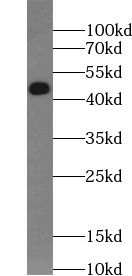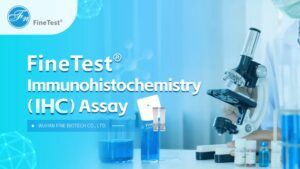Products
TGFB1 antibody
Category:
Research Area:
- SPECIFICATIONS
- Product Name
- TGFB1 antibody
- Catalogue No.
- FNab09851
- Size
- 100μg
- Form
- liquid
- Purification
- Immunogen affinity purified
- Purity
- ≥95% as determined by SDS-PAGE
- Clonality
- polyclonal
- Isotype
- IgG
- Storage
- PBS with 0.02% sodium azide and 50% glycerol pH 7.3, -20℃ for 12 months(Avoid repeated freeze / thaw cycles.)
Immunogen
- Immunogen
- transforming growth factor, beta 1
- Alternative Names
- CED antibody, DPD1 antibody, LAP antibody, TGF beta 1 antibody, TGFB antibody, TGFB1 antibody, TGFbeta antibody, TGF-beta1 antibody, TGF-β1 antibody
- UniProt ID
- P01137?
- Observed MW
- 44 kDa
Application
- Tested Applications
- ELISA, WB
- Recommended dilution
- WB: 1:500-1:2000
Validated Images
 A549 cells were subjected to SDS PAGE followed by western blot with FNab09851(TGFB1 Antibody) at dilution of 1:1000
A549 cells were subjected to SDS PAGE followed by western blot with FNab09851(TGFB1 Antibody) at dilution of 1:1000
- Background
- TGFB, also named as LAP and TGFB1, is a multifunctional peptide that controls proliferation, differentiation, and other functions in many cell types. TGFB acts synergistically with TGFA in inducing transformation. It also acts as a negative autocrine growth factor. Dysregulation of TGFB activation and signaling may result in apoptosis. Many cells synthesize TGFB and almost all of them have specific receptors for it. TGFB positively and negatively regulates many other growth factors. It plays an important role in bone remodeling as it is a potent stimulator of osteoblastic bone formation, causing chemotaxis, proliferation and differentiation in committed osteoblasts. It is highly expressed in bone. Mutation of TGFB are the cause of Camurati-Engelmann disease(CED) which known as progressive diaphyseal dysplasia 1(DPD1).



